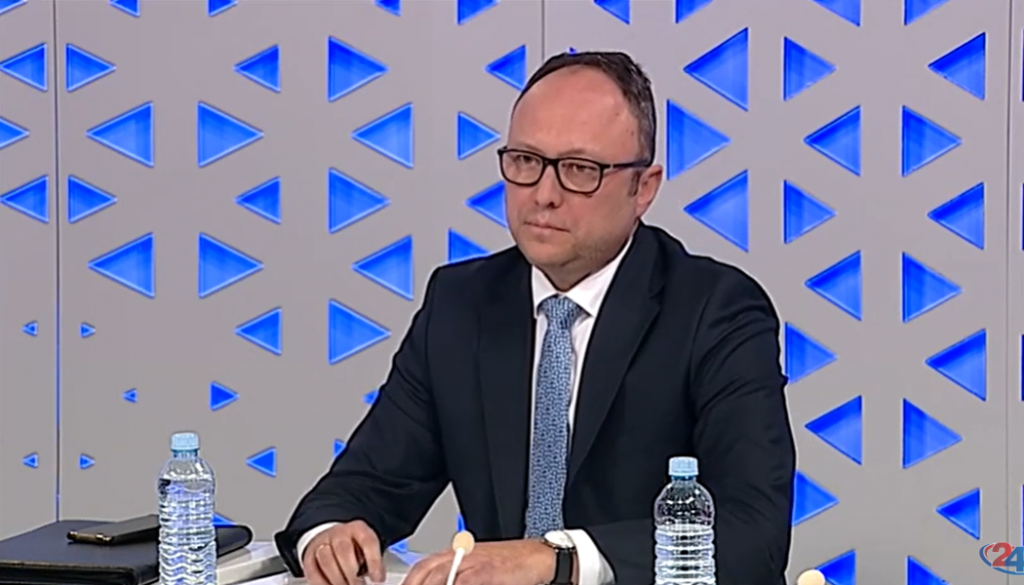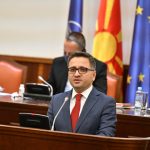9th November 2022, Skopje – Funds are accurately and precisely projected under the 2023 Draft Budget, pertaining to harmonization of the public sector wages with the minimum wage, allocating EUR 250 million so as to cope with the crisis, as well as funds for increased pensions, with the capital investments being a driving force thereunder.

This was pointed out by Deputy Minister of Finance, Filip Nikoloski in his guest appearance at “24 Analiza” at 24 TV Channel, thereby stressing that the 2023 Draft Budget is a direct response to the challenges of the crisis, reflecting the measures and policies, which the Government adopted, i.e. will adopt in the next year, thereby foreseeing macroeconomic stability and fiscal consolidation.
“2023 Draft Budget comprises three main aspects. First and foremost, EUR 250 million has been allocated as support for coping with the ongoing crisis, which will most probably be protracted until the first half of the next year. Than, additional funds have been allocated for the retirees, i.e. the amount of money for the Pension and Disability Insurance Funds, has been increased by EUR 120 million, being one more affirmation that this Government takes good care of the pensioners, since it is a well-known fact that the pensions have been so far increased by around 10% this year, which are to be additional increased by at least 6% as of March next year already. The third most important aspect are the capital expenditures, projected in the amount of EUR 800 million, which will be a strong impetus for the economy, Deputy Minister, Nikoloski stressed.
He emphasized that sectors which wages grew this year, will receive such increased wages next year as well, as projected under the 2023 Draft Budget.
“This year, we took good care for the majority of the employees. Wages in the field of education were increased by 15% for more the 37000 employees therein, followed by the growth of 5% for 12000 people employed in the Ministry of Internal Affairs, 30% for 3500 people employed in the field of culture, 15% for more than 2600 of the staff in the judiciary sector, 5% for 20,000 health sector employees, as additional increase to the wage growth of 15% and 20% in the previous years, followed by the 7% increase for 4000 of the personnel in the university education sector. It is a matter of more than 80 thousand public sector employees. Additional linear increase will be realized for 25 thousand employees, with minimum wage being one of the wage components thereof, Nikoloski said.
He went on that under the set minimum wage growth model, in March, it will increase by 10%, thus reaching almost Denar 20,000, i.e. as he emphasized, in March this year, it amounted to Denar 15,200, while in March next year, it will reach Denar 20,000, being higher by 31%, which is a 100% increase when compared to the wage as of six years ago.
As for the capital expenditures he pointed out that capital investments will be a driving force in the 2023 Budget, expecting more intensified project implementation, with the capital expenditure execution reaching minimum 90%.
“In 2023, capital investment will be a driving force. Most of the investments planned this year, will be implemented next year, whereby I expect for at least 90% thereof to be realized. Out of EUR 800 million, over 40% are projected for infrastructure, above all Corridor 8 and Corridor 10D, followed by the highway sections Tetovo-Gostivar, Trebenishte- Struga, the railway line towards Bulgaria and others”, Deputy Minister of Finance stressed.
He also touched upon the tax reform, covering neither new taxes nor increased taxes.
“Concept, which was broadly debated with all relevant stakeholder, is only part of the Tax Reform Strategy. Thus, it is not a matter of new taxes, but rather certain tax exemptions, by taking into account all recommendations and notes as discussed with all stakeholders. There are several scenarios and we will soon present the ones to be applied next year, and those for both 2024 and 2025, since this reform will be gradually implemented, Deputy Minister of Finance pointed out.
He pointed out that the Government has the capacity to deal with the crisis, mentioning once again that given the both set of anti-crisis measures worth EUR 760 million, as noted by the World Bank as well, our country has allocated most funds as percentage of GDP in the region, aimed at coping therewith.
















